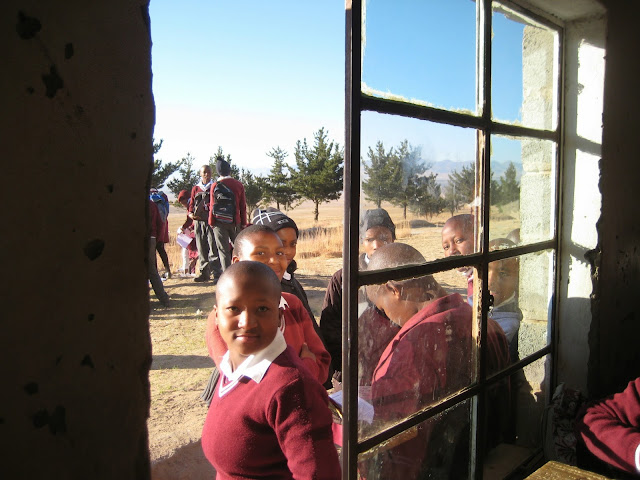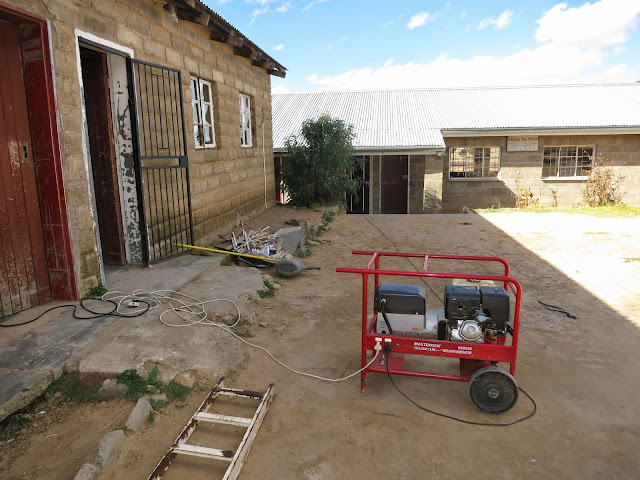Recently my posts focused on the several community projects my counterparts and I are engaged in. However, my day to day can be generally just as uneventful as yours and I wanted to share that with you in an extremely unnecessary and analytical way.
In the Peace Corps, I have become more diurnal than my previous university self. I can barely stay up after sunset, and I wake up just 30 minutes post-sunrise. Summertime I usually wake up around 5, and now that it is Winter I wake up around 7. It’s still pretty cold nowadays, so when I wake up I stay huddled in my blanket trying to absorb some of the leftover warmth of my rubber water bottle heater. Technically, teachers are required to be at school at 7am to observe the morning study. However students are always late, and teachers are even later. It supposedly happens every year. When the school year starts, teachers and students are gung-ho and we are always present before 7. As the school year proceeds, we show up progressively ten minutes later than the previous month until we reach the 2nd semester, where we show up at 8am. During my training, we were encouraged to integrate by modeling behavior, therefore this is subjectively one of those opportune moments to gain an optimal standard of integration. I’m not lazy, I just want to retain the heat I generated in my cocooned blanket throughout the night.
7:45am. I am late. I jump out of bed, brush my teeth outside, toss my pee bucket remains into my “flourishing” garden, greet my neighbor child pooping in the trash heap ahead of me with a gentle wave, slip into some warmer clothes for school, drag my two solar setups outside and rush out the door. As I walk towards the school I realize I left my red pen back home, run back, realize I should probably urinate and run back out to my latrine for a quick release.
Basotho roulette to see who greets me in the morning
I get to school by 8:00am. We are late to start our morning assembly, but I somehow always arrive right before the students sing the National Anthem. In the United States we raise our right hand and place it over our heart to recite the pledge of Allegiance. In Lesotho we sing (sometimes passionately, we are a big singing people) the National Anthem and keep our arms and hands at our sides parallel to our bodies. After, we sing a church hymn. We have 5 grades in the school, so Form A leads the songs on Monday, and Form E closes with usually a stellar performance on Fridays. The Form A’s for some reason just don’t get it. We have done it everyday since the beginning of the year, but they always, as a collective group of 150 students, somehow forget that they should sing. Heathens. After some announcements, the teachers release the students to the classrooms except for the Form A’s. Because they didn’t sing on time, and probably sang pseudo-synergistically, becomes pertinent to have a massive corporal punishment session.
The morning assembly line-up
8:20am. The form A’s line up to receive their weekly character building energizer. Honestly, corporal punishment isn’t that bad at my school. My staff has even talked about how we shouldn’t do it as much, but it’s just an easy solution for the teachers - students actually say if you don’t beat them, they won’t learn. Parents even want teachers to beat the children. I don’t beat any students however, I do punish by ensuing creative psychological embarrassment torture methods. What I dislike most about this method of punishment is that it causes a lot of noise, which is distracting when I am teaching a different class. Also, I expect the teacher who is beating the students to be very tired, that’s over a hundred swings. Students are smart however. They always seem to move their hand at the right time away from the stick in order to lessen the blow.
The students are choosing who gets beaten first
9:20am. I get to my favorite class. These students know how to distract me, but I don’t even mind. They always get me to talk about sex, and since we don’t have Life Skills I consider these lessons important. I always talk about HIV/AIDS, its history, prevention, and treatment. However recently we started talking about other sexually transmitted diseases. I usually get my phone and browse the Internet for various disturbing photos and pass it around as a teaching aid. Recently a student somberly sauntered up to me and said, “Tonight I will have nightmares.” I was proud, but I think I did my job when another told me he would never have sex. I don’t tell them sex is bad, I just describe that it can be dangerous if you are too scared to pose questions, don’t protect yourself and or know the risks. A result of encourage inquisitive minds led to a complete backfire.
“Sir is sex nice?” “How do girls masturbate?” “Do you do the oral sex?” I thought I was supposed to make them feel uncomfortable. I am not sure if it is right, but I try my best to answer accurately yet appropriately. Keep in mind that many of us learned from Google because we were too encumbered to ask our towering adult figures. They don’t have the luxury of the Internet and the parents are even less knowledgeable of the issues. I like to think I am a walking, talking, sextionary (sourcing my iPhone).
I also had to teach about crabs
10:40am. I get a break, run back home and eat some leftover dinner for an early lunch. Sometimes I buy makoenya and polony, which are essentially fried dough bread balls and bologna. It is not bad, but not that great either. Then I get back to school to finish the rest of my classes.
Students relaxing on break absorbing sun to stay warm
At 1:00pm we break for lunch. All of last year I used to eat the school food. I now choose to eat at home. I enjoy Basotho food, but not school food. Often you encounter foreigners in African countries chastising the quality of the food the African children or people eat and advertise it as an injustice. Although I don’t eat the school food, the kids love it. Just because it isn’t American style food doesn’t mean the whole continent is starving. Papa (boiled corn meal, almost like plain grits) and Meroho (spinach or cabbage) are what the students usually get. Tuesdays and Wednesdays they get protein through beans, eggs, or hot dogs (we call them Russians). Around this time, we as the teaching staff can just relax and chat. Usually it is all in Sesotho but it turns into English whenever I want to chime in.
This is papa (white)
We have fun conversations on all sorts of topics. My favorite conversations however are when we talk about the differences in our accents, or when they teach me inappropriate Sesotho lingo.
When classes end, the afternoon study begins around 2:00pm. Some teachers and I will work on secondary projects, which included the HIV/AIDS Soccer Tournament, the Solar Paneling, and now the Library. The library is coming together really well, but slowly; I will create another post on its completion.
I get home around 4:00pm at which time my Mother never ceases to send a whatsapp encrypted, “Good Morning Shawnee.” Now, I have never brought this up with her, but I hope she realizes I am at least 6 hours ahead. So when she says good morning, does that mean she is telling me she is having a good morning? Or is she telling me that tomorrow when I wake up to have a good morning? She calls every few days and we chat for an hour while I pace around my house. I can’t bring my phone inside or else I lose reception. During the call, she always laughs at the random chicken or cow noises in the back, the numerous children squabbling, and my interrupted greetings to fellow villagers (it is very rude to not say hello here).
These boys are always playing knock-knock ditch
At 5:00pm students sometimes show up for some extra studying or just to talk. I don’t mind because it is often the older students who are around my age. While they are hanging out on my couch I indulge them with random American foods or anecdotes and prepare dinner. I try to cook early while I have daylight because cooking and eating by candlelight may be romantic for two, but it is intolerably ill advised for one. They leave just before dark and I start eating my dinner while warming up water for my bed. I snuggle into the covers around 7:30pm, watch some random movie or tv show on my laptop while whatsapping friends in the States and here. I quickly fall asleep around 9:00pm if I am able to make it that late.
The family I usually say goodnight to
I am lulled to sleep by the gentle random unpredictable church hymns surrounding the school compound getting ready for another day.
I hope you enjoyed getting an exclusive peek into the wonderful world of a rural Peace Corps Volunteer. In related news, I have been nominated as a finalist for the Blog it Home Competition for the Peace Corps. The Peace Corps has three goals which paraphrased are: 1) Do Development Work for your Host Country. 2) Provide Insight into American Culture to Locals. and 3) Make Americans aware of your Host Country and what it is like to be a Peace Corps Volunteer.
This Peace Corps Competition is centered on the 3rd goal, and with your help I may be able to attend a conference in Washington D.C. to represent my host country of Lesotho (The Forgotten Kingdom). As an avid Math/Science enthusiast, I rarely considered anything English-Oriented of mine to be generally literate, but it has been very encouraging to hear all your comments about my blog, my work, and especially being recognized as a finalist. Between August 1st and 10th you will get an opportunity to like a certain picture that is linked to my blog on the national Peace Corps Facebook Page. The more likes/comments I get, the more likely I can become one of the chosen ones in September.
Like the photo by clicking this link:
https://m.facebook.com/peacecorps/photos/a.10152404780060914.1073741843.110634980913/10152404780180914/?type=1&source=43
If all goes well, maybe I'll see some of y'all in D.C.






















